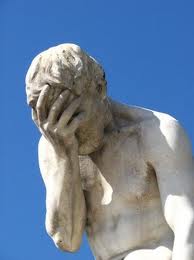 (listen to the first story; first 15′)
(listen to the first story; first 15′)
Greece is about to issue 5 year bonds again. Berlin, Brussels, Frankfurt and Athens are celebrating Greece’s recovery. For my part, I think (and tell the BBC World Service) that this is a sad day for Greece and it is a sad day for Europe. Why do I refuse to be impressed and join in the celebrations? It is because the Greek state and the Greek banks remain deeply insolvent. And, their return to the money markets is a harbinger of the next terrible phase of Greece’s crisis, rather than a cause for celebration.
But, I hear you ask, how is it that (if I am right that the Greek state and the Greek banks remain bankrupt) international investors are prepared to buy the new Greek bonds and the fresh shares issued by Greek banks? There are two explanations: One is the extraordinary demand for subprime assets internationally, due to the ultra low interest rates that investors are facing. Junk bonds are indeed having a renaissance these days, globally. And Greece’s assets are Europe’s new, revivified subprime market. But why the Greek assets in particular? The second reason behind the Grand Greek Paradox (of heavy demand for the paper issued by the insolvent duo of Greek banks and the Greek state) is that Berlin has, at last, ditched well and truly the idea of chucking Greece out of the euro. Greek assets reached their nadir when fear of Grexit heightened, in mid 2012. Once that fear lifted (due to Berlin’s political decision to keep Greece inside the euro pen) these assets rebounded – a kind of ‘dead cat bounce’. Moreover, Berlin’s ironclad determination to declare victory in the case of the Greek crisis between now and the May European Parliament Election has increased the magnitude of the rebound. Put bluntly, Berlin and Frankfurt are essentially signalling to the money markets that it is safe to buy Greek subprime assets, indicating two things: That the official sector will stand by Greek bonds, with a new program, and that the ECB will turn a blind eye to the black holes in the Greek banks. And all this while the real economy of Greece is continuing its incredible decline – as documented recently here. By the time the bond and equity markets realise that it has all been fool’s gold, the May European elections will be over, the European Establishment will have been returned to Brussels, and the editorials about Greece’s remarkable comeback will be a distant memory.














